
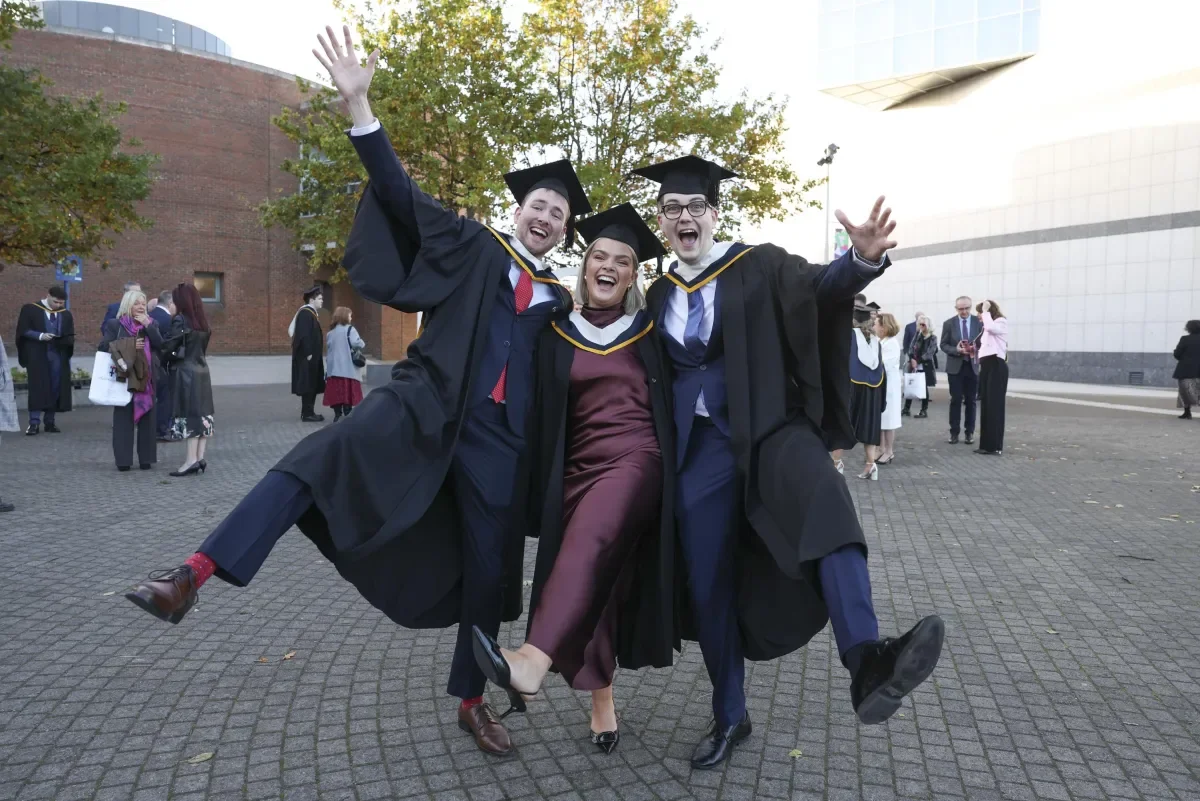
DCU Graduate Profiles
Congratulations to all our new graduates!
We hope you enjoyed your graduation as much as we did! It was wonderful seeing you all finally meet up with your former classmates and celebrate your achievements together.
We wish you the best in your future careers and hope to see you stop by soon.
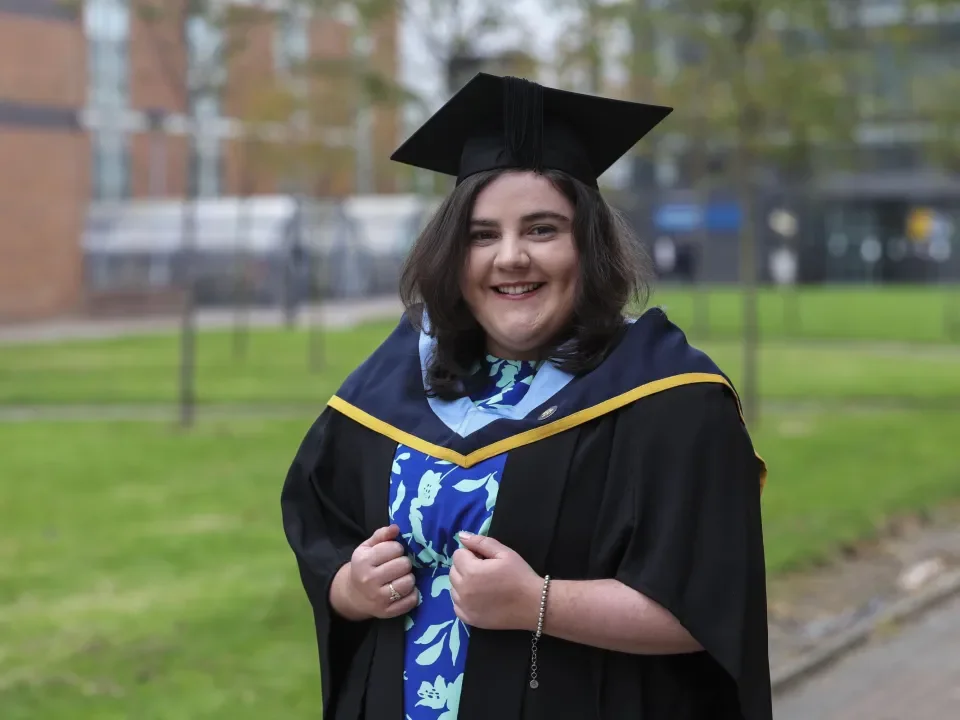
Deirdre Croghan, Bachelor of Education in Gaeilge with French, German or Spanish at DCU.
With her love of French and Irish and her dream of being a teacher, the BEd in Languages was the perfect fit for Deirdre Croghan, and the degree offers other options beyond teaching.
For Deirdre Croghan, teaching is a real family tradition. “I always knew I wanted to be a teacher for as long as I can remember, she says. “My mum is a teacher, and my granny was a teacher, and my uncle is a teacher. So it's definitely in the blood.”
In school, she also loved languages and so when it came to CAO choices, DCU’s Bachelor of Education in Gaeilge and French, German or Spanish seemed to tick all the right boxes. “I said, that sounds like something I'd love.”
Deirdre, from Ballymoe, Co Galway, had been at several different University open days, but at DCU she “just got a really nice feeling” meeting with students and talking to lecturers. The family connection was also a positive because the St Patrick’s campus was where her mother graduated as a primary school teacher and “she loved it as well.”
The course combines teacher education with Gaeilge and one other language, in Deirdre’s case French. This combination meant there was “a lot to fit in” in four years.
“I think the way the course is structured is brilliant,” says Deirdre, who says the small class sizes allowed for a nice atmosphere and lots of interaction with lecturers.
In the first and second years, the focus is on theory and preparation, and then in third and fourth year, the students do school placements. At that point, Deirdre felt they were well prepared and had the skills needed to perform well in the classroom.
“You're not thrown in at the deep end at all. In the lectures, you're building up slowly and you're developing your skills.”
The 4th year placement was a vital part of preparation for the ‘real world’ of teaching. With 12 hours per week of teaching time, it is closer to the workload of a full-time teacher than other teacher training courses. During this period, the students got constructive feedback and support from tutors who visited their schools.
“It is high pressure, high reward, and looking back now, it is such good preparation for when you become a qualified teacher.”
One of the course highlights for Deirdre was her Erasmus semester, which she did at a university in Metz in northern France. Picking a smaller French city was a deliberate choice.
“We knew there probably wouldn’t be that many other English speakers there, and that was kind of the objective that we'd really have to muck in and speak French and be friends with natives.”
“Looking back now I can see how much it improved my French when I was there, especially at the beginning.”
Deirdre now works as a French teacher at Scoil Mhuire, a post-primary school in Strokestown, Co Roscommon, and she’s found that the experience of living abroad still benefits her in the classroom.
“Even now, when I'm teaching I find myself bringing in a lot of the cultural stuff that I experienced in France only two years ago, and I can see the students with their eyes open wide, listening to me. They love that, the real lived experience of being in the country.”
In what was a busy four years, Deirdre also managed to fit in her work as a DCU student ambassador, which involved leading campus tours, contributing to Open Day talks and doing a podcast.
Deirdre says that chatting with prospective students was her favourite part of DCU Open Days. “It's so important to talk to a current student who has the lived experience. I liked to share my experience with the prospective students and give them tips and tricks that are actually really useful.”
For those considering the course, Deirdre points out that it opens more doors than teaching alone. “You do qualify with a degree in 2 languages as well, so that leaves you open to a lot of opportunities.” Options for graduates could include working in translation, or careers with the EU or other international agencies.
Reflecting on her time studying at DCU, Deirdre says the course was demanding but there was never a dull moment. “It was busy, but so worth it at the end.”
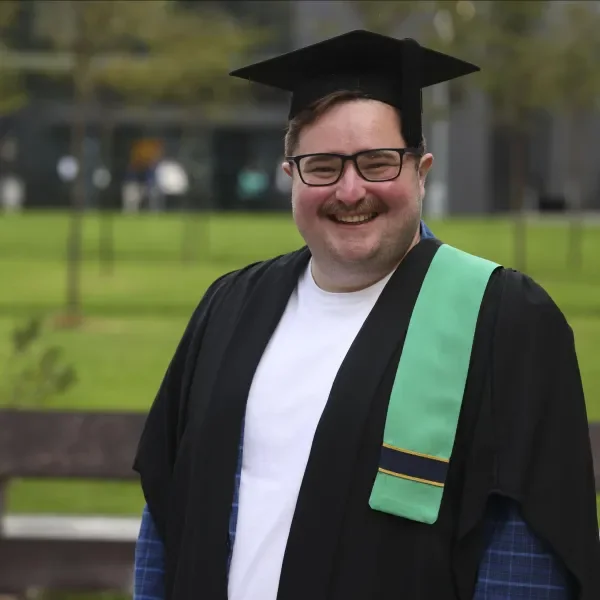
Will Dwyer-Joyce, Certificate in Peer Support at DCU
Will Dwyer-Joyce finally found the university experience he wanted with DCU’s Certificate in Peer Support - and says the course has given him greater confidence.
Will Dwyer-Joyce’s personal challenges with an eating disorder and his experience of working in the mental health sector were what drew him to DCU’s Certificate in Peer Support. “It really spoke to me,” says Will about his experience on the course.
The programme is for people with a personal experience of mental health issues who wish to work as a peer support worker or in similar roles in the sector.
Will works at the Lois Bridges centre, an in-patient unit that treats people with eating disorders. Previously, he himself received treatment at the centre and so had a personal understanding of the issues, particularly for male patients.
He points out that “one in three people with eating disorders are men” but the issue remains relatively hidden.
Will had already begun to work with Lois Bridges as a co-facilitator for a support group for men with eating disorders. It was then that a colleague told him about the Certificate in Peer Support, saying “I think you'd be really good at that.”
“I went into DCU with a lot of educational baggage,” admits Will, who had started University courses in the past but could not complete them due to his struggles with a binge eating disorder.
At DCU, a number of aspects of the course were a welcome surprise including the emphasis on discussion and engagement and the supportive atmosphere fostered by the teaching staff.
“It’s a really multi-faceted course where you're learning about many different aspects of mental health struggles,” says Will. He found the diversity of the course participants from a wide variety of backgrounds made for “a rich learning experience”.
One of his “lightbulb moments” was the realisation that Peer Support is not about trying to “fix” people. Instead, he believes it’s about understanding that everyone has a unique way of dealing with their issues. “There are many ways to walk up a hill,” says Will.
His experience on the course has given him greater confidence in bringing his personal experience to the table when discussing cases with the multidisciplinary team at Lois Bridges. “I'll say things and they go, ‘I actually didn't think of it that way.’”
After his previous experiences in higher education, he is particularly proud to have received a first in his Certificate. “This time I think it was something I was really passionate about. I was using my lived experience and it gave me a sense of meaning to everything that had come before,” says Will.
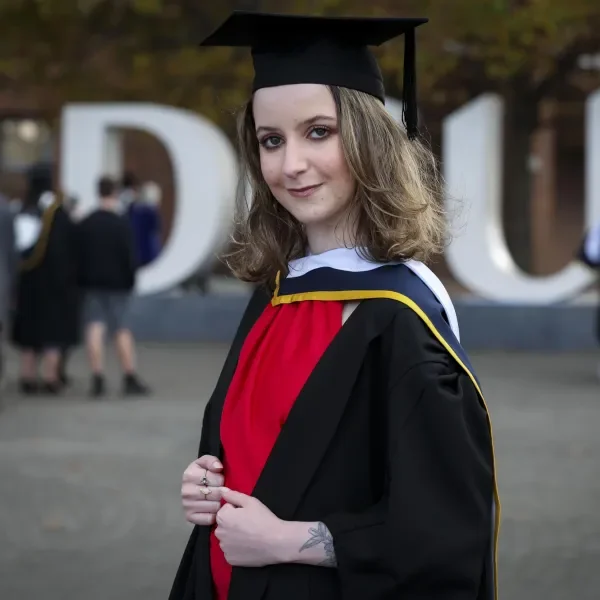
Rocio Martos Roberts, BA in Communication Studies at DCU
“I knew I wanted something creative,” says Rocio Martos Roberts, describing her search for the right college course.
Rocio describes herself as a “very visual person” who also loves writing and reading. She chose her course at DCU because “I think the Communications Studies degree kind of had it all.” It was broader than some other degrees and offered “a really good base of understanding communication in general.”
Originally from Argentina, Rocio moved to Naas, Co Kildare during 5th year. And while she found secondary school too structured, DCU was a different story. “When I got to university it was so refreshing because I was actually doing something that I was interested in.”
In first year, the focus was largely on theory while second year introduced more practical work in areas like radio, podcasts, video and photography.
“I was surprised about how much I enjoyed learning about the theory behind things,” says Rocio. “In second year, I was able to make the connections between what I had learned in first year and the practical things that we were doing.”
One of the team assignments was to create a three-minute video, which was an eye-opener for Rocio and her classmates. “Three minutes sounds so short, but the amount of work that goes into it is insane.”
For her radio project, Rocio created a “sound walk” which involved capturing a soundscape from a specific location. The project is being published on the Communications Undergraduate Journal website.
Throughout her time at DCU, Rocio says the teaching staff were hugely helpful. “I would reach out to them if I had any questions at all, and they would always help me and they're also just such nice people to talk to. They're so open.”
Rocio threw herself into the social side of the University experience as well, getting involved with groups including DCU Photo Soc, DCU Drama Soc and Her Campus. “I liked having a mix of different friends from different courses because then you got different perspectives.”
In third year, she worked as a Student Ambassador, which “didn’t even feel like working” and led to some lasting friendships with people on the team. “We still meet up once a week or every two weeks, just to go out for drinks or food because we just became such good friends.”
Rocio has just started a new job working as a customer relationship management executive with Buymie, a subsidiary of Dunnes Stores.
“I'm very excited about it,” she says. “It's so dynamic.”
Reflecting on her time at DCU, Rocio believes the Communications Studies BA is a great course for people who are creative and curious.
“You're going to learn a lot about why people communicate a certain way, what messages are effective, what messages aren't, and why.”
“I loved it because I just love understanding how people work. And that's basically the core of communication, just knowing how people work and what they respond to.”
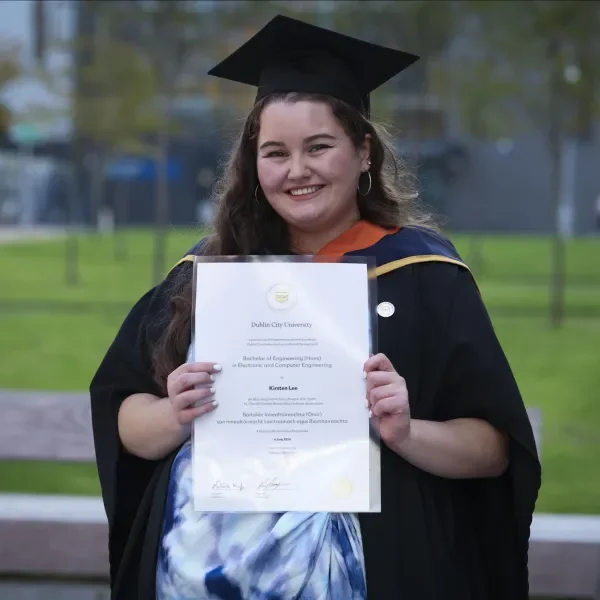
Kristen Lee, BEng in Electronic and Computer Engineering at DCU.
Until she was 17, Kirsten Lee hadn’t even heard of engineering as a career, but that’s all changed now. The recent graduate of DCU’s Bachelor of Engineering is passionate about promoting the subject whenever she can. “I honestly feel like I’ve found my calling in life,” she says.
Growing up in a working class family in Finglas, she was the first of her immediate family to go to higher education.
University only came on the horizon for her when, aged 11, she got a scholarship to DCU’s Centre for Talented Youth Ireland (CTYI). The course at CTYI introduced her to the world of science. “That got the ball rolling", she says. “I thought, maybe I can go on to higher education.”
At secondary school, it was clear she had a natural ability in maths and physics, but in her all-girls school, subjects like construction and metalwork weren’t offered, and STEM courses weren’t widely promoted as a college option. But then in fifth year, a guidance counsellor remarked that engineering might suit her skills. “That kind of left a little thought in my brain.” says Kirsten.
The more she looked into it, the more engineering ticked the boxes, particularly the Common Entry Bachelor of Engineering offered by DCU. “It seemed to have really good career progression, regardless of what I wanted to do. I could go into industry, I could go into consultancy. I could go into academia, so it seemed like a really good opportunity to try out things and see where it took me.”
In first year, the start of her engineering journey took her down an unexpected path. Kirsten thought she’d like to do biomedical engineering but realised she didn’t really enjoy it. To her surprise, the electronic engineering modules were the ones that sparked her interest. She found that she had a real skill for building circuitry, and quickly understood electronics theory.
“It was a light bulb moment,” she says, that convinced her that this was where she wanted to focus over the course of the four-year degree.
Professional work placements are a critically important part of the degree course. Kirsten’s placement was in the Cloud and Engineering Department at Deloitte where she got hands-on experience as part of the modernisation team working on a project for a public sector client. On completion of her degree course, Deloitte offered her a job.
She now works in the firm’s digital health department, working with public and private sector clients on modernising healthcare systems and cloud migration. The job is busy and demanding but enjoyable and varied, according to Kirsten. “I love how dynamic it is. I love that there's so many different things you can do.”
Kirsten is passionate about spreading the gospel of engineering and the broader opportunities that Higher Education offers. That has included giving talks in primary and post-primary schools about electronic engineering, and volunteer work with organizations like Junior Achievement Ireland, who engage with students in DEIS schools.
She was nominated for a Women in STEM award for developing and delivering a summer camp for secondary school students in advanced electronics. “I nearly hit the deck when I got the email saying, congratulations you've been shortlisted!” she says.
Graduating in the top 2 of her class and now working for a major international firm, Kirsten reflects that she’s come a long way from the time when she wasn’t aware that careers like this existed. “I would have never imagined this when I was 17 and I didn't know what engineering was.”
Kirsten would like to see more women in her sector. She recognises that the gender imbalance on some engineering courses may be daunting for some girls. “I have been in classrooms where I'm the only woman, lecturer included. And it’s so powerful that even if I'm just the one woman there, I can be that role model for younger girls.”
“Just do it, because if you do it, then you're creating that balance that we need in the industry,” is her advice to girls considering an engineering degree.
While not long in her current position, Kirsten is already thinking about her career trajectory.
“I have my ten-year plan. Ideally, I would love to come back to academia and get a PhD. It all goes back to education and teaching for me.”
She says she wants to get more experience in her field before deciding on the area she would like to specialise in for her doctoral studies.
Kisten aims to “see what's out there, and then I will probably have that light bulb moment.”
The one thing she’s sure about is her hope to return to DCU one day. “They've been told not to change the locks in the School of Electronic Engineering because I will be back at some point!”
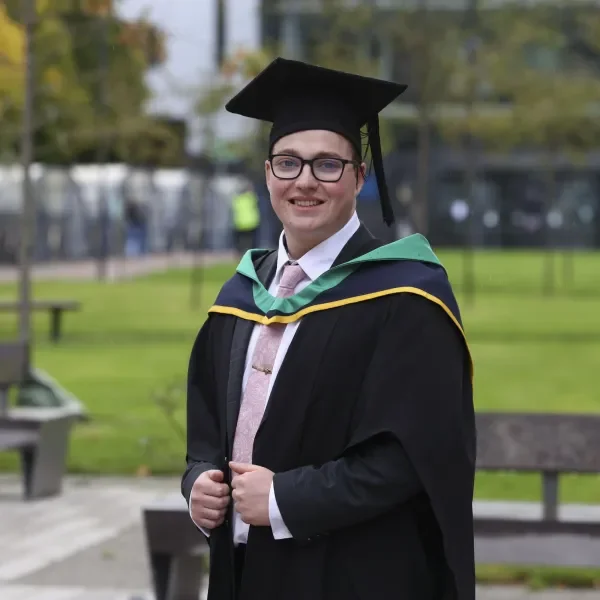
Tomás Broe-Brady, BSc Actuarial Mathematics at DCU.
During his time studying at DCU for the BSc Actuarial Mathematics Tomás combined his love of maths with an active social life through the DCU Weightlifting Club.
Tomás' time in DCU was taken up with a lot of heavy lifting - both physical and mathematical. His studies centred on his Actuarial Maths course but he was equally enthusiastic about his sporting activities with DCU’s Weightlifting Club.
Tomás, from Ratoath, Co Meath, says the course is ideal for people who are passionate about maths, with the added bonus of excellent employment opportunities for graduates. In fact, when we catch up with him, he’s just finishing his first week as a trainee actuary at Irish Life. A number of his classmates have also joined the company and he says “it's nice to have a few familiar faces around.”
The first two years of the course were “a nice balance” between pure maths modules and programming subjects. While his lecturers were great, Tomás says the step up to University-level maths can be challenging. He found that the DCU Maths Learning Centre was a great resource, which is used by students from a whole range of ‘maths heavy’ degrees. Having received the help and advice of tutors at the centre in his first two years, Tomás later went on to work in the centre himself.
Things really clicked into place for Tomás in the second half of his four-year degree, when the course focused on the “real world” applications of the subject. In particular, his 8-month work placement in the Central Bank of Ireland gave him a clear idea of what it was like to work in his sector. “That gave me a great experience of the entire insurance industry and I got a real look at the types of work you actuaries do,” he says. It confirmed that this was “something I'm really interested in getting into.”
While he enjoyed his studies, Tomás reckons getting involved in clubs and societies is a really important part of the college experience. “They're a lot of fun. You make great friends through them and it's really a break from the college course.”
Tomás joined the Weightlifting Club in first year and never looked back. He served as chair and treasurer during his time at DCU and has travelled internationally to take part in competitions in Denmark and Wales.
As well as making good friends, Tomás says that his sporting activities were great for helping him to unwind. “It wasn't all about the college stuff, even coming up close to exams. There's still that bit of a break. So I think it’s good for almost everyone to have a hobby or join a club.”
But while they might seem worlds apart, Tomás sees real similarities between his hobby and his course. He says weightlifting is “a very technical sport” where you need to keep making adjustments to get a lift right - a process similar to the one he uses in his professional life. “You know, we're doing calculations, changing little stuff, doing it over, thinking it through.”
The difference is, with weightlifting, “I can turn the brain off a little bit and relax!”
